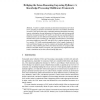400 search results - page 38 / 80 » Singularities in Qualitative Reasoning |
ECAI
2010
Springer
13 years 6 months ago
2010
Springer
Bipolarity is an important feature of spatial information, involved in the expression of preferences and constraints about spatial positioning or in pairs of opposite spatial relat...
IJCAI
1989
13 years 10 months ago
1989
Solving design and analysis problems in physical worlds requires the representatio n of large amounts of knowledge. Recently, there has been much interest in explicitly making ass...
NGC
2006
Springer
13 years 8 months ago
2006
Springer
This paper examines two seemingly unrelated qualitative spatial reasoning domains; geometric proportional analogies and topographic (landcover) maps. We present a Structure Matchin...
KI
2007
Springer
14 years 2 months ago
2007
Springer
To achieve complex missions an autonomous unmanned aerial vehicle (UAV) operating in dynamic environments must have and maintain situational awareness. This can be achieved by cont...
AAAI
2008
13 years 11 months ago
2008
Direction relations between extended spatial objects are important commonsense knowledge. Recently, Goyal and Egenhofer proposed a formal model, called Cardinal Direction Calculus...

